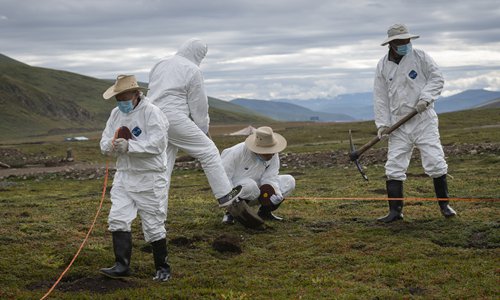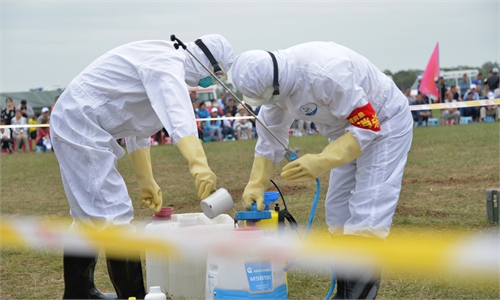
Mice control team works in Ganzi, Southwest China's Sichuan Province to examine the population of the rodent and test whether they carries plague bacteria in September 2019. Photo: VCG
A 3-year-old child in Menghai county, Southwest China's Yunnan Province, was diagnosed with a suspected case of bubonic plague, the local authorities said on Friday.A level-IV emergency response has been launched to prevent the spread of the plague.
The boy suffered from a mild infection, but is in a stable condition after receiving treatment, an official from the county government, surnamed Gao, told the Global Times Saturday, adding that he is the only infected case found so far.
The case was found during a countywide screening for the disease, after three rats were found dead for unknown reasons in a village. Local disease control authorities initially concluded on September 21 that a rat plague occurred in Xiding, Menghai.
Gao noted that a plague emergency response across the county began as soon as the case was found. Experts on national and provincial levels have been sent to Menghai to support the village's plague control. The local authority has set up a working team to carry out inspection, diagnosis and quarantine for locals, and reminded residents to quickly report if they had any contact with the dead rats, and seek medical advice if they show fever-like symptoms.
A sanitation campaign focusing on eradicating fleas and rodents has also been ongoing throughout the county, Gao said.
The sporadic cases of the plague sparked public concerns, as it was also reported in North China's Inner Mongolia Autonomous Region in August, where two died. Wang Peiyu, a deputy head of Peking University's School of Public Health, told the Global Times on Saturday the plague is unlikely to spread in Yunnan, but the public needs to be alert to the possibility of infections, as it can spread quickly among rats.
"Infected rats are a key source of the disease, which also transmits to humans through bites from infected fleas," Wang said, noting that the bubonic plague won't be passed from human to human directly.
The disease, a top infection disease classified under China's Law on the Prevention and Treatment of Infectious Diseases, progresses very quickly after people get infected, Wang said. "The patient would develop fever, and then suffer from swollen lymph nodes, sepsis, organ failure and even death," Wang said, adding that the death rate would reach 40 to 50 percent.
The bubonic plague occurs mostly in rural areas, grasslands, mountains and places where people have frequent contact with rats. It is not new to Yunnan, as sporadic cases showed up over the years, the expert said.

